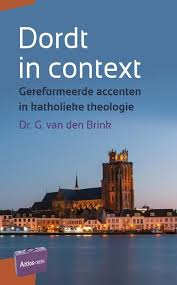Dit jaar staan protestanten in Nederland stil bij de nationale synode die 400 jaar geleden in Dordt heeft plaatsgevonden. Het was een belangrijke periode in de jonge Republiek en in de ontwikkeling van het Nederlands protestantisme. De Dordtse leerregels behoren tot het protestantse erfgoed. Gijsbert van den Brink schreef bij gelegenheid van 400 jaar Dordt het boek “Dordt in context.” Eduardo Echeverria schreef een recensie. Een langere versie verschijnt later in het tijdschrift Perspectief. Het belang van het boek van Van den Brink is onder andere dat hij de theologische vragen waar het in Dordt over ging in een veel breder, oecumenisch perspectief plaatst. Daarover gaat de studiemiddag op 8 februari van de Katholieke Vereniging: “Dordt en Franciscus over de bestemming van de mens”
 Gijsbert van den Brink (photo), holder of the University Research Chair in Theology & Science in the Theology Faculty, Vrije Universiteit, Amsterdam, has written an informative study in historical theology on the Synod of Dordt and its final product, the Canons of Dordt (1618-1619). The Canons affirm the Reformed doctrine of divine election, or unconditional predestination, election and reprobation, in rejection of the Five Articles of the Remonstrants (1610). The Articles affirmed, for example, conditional election, resistible grace, unlimited atonement, rejecting total depravity, and the “once saved, always saved” presupposition of the teaching regarding the perseverance of the saints (13-23, 45-67). Van den Brink gives a diachronic and synchronic account of the Canons’ assertions about divine election. Regarding the former, he gives a “bird’s eye view” of the history of what the Canons teach by tracing this teaching back to Augustine, to his doctrinal struggle with Pelagius, onward to the medievals, for example, St. Thomas Aquinas, Blessed John Duns Scotus, leading us to the Protestant Reformers, such as Luther, Calvin, Bullinger, and Beza (24-44), and, last but not least, to Jansenism (105-121). He also gives an instructive account of the contemporary context in which the Synod occurred and the Canons were produced (45-79), particularly with respect to the significance of the latter 16th century, Dutch Reformed theologian Jacobus Arminius (45-67), and the production of the Five Articles after Arminius’ death (1609) under the leadership of Simon Episcopius. Also relevant here for understanding the Canons is its precursor in the 1611 Affirmations in the document of the “counter remonstrance” that is a preliminary response to the Remonstrants.
Gijsbert van den Brink (photo), holder of the University Research Chair in Theology & Science in the Theology Faculty, Vrije Universiteit, Amsterdam, has written an informative study in historical theology on the Synod of Dordt and its final product, the Canons of Dordt (1618-1619). The Canons affirm the Reformed doctrine of divine election, or unconditional predestination, election and reprobation, in rejection of the Five Articles of the Remonstrants (1610). The Articles affirmed, for example, conditional election, resistible grace, unlimited atonement, rejecting total depravity, and the “once saved, always saved” presupposition of the teaching regarding the perseverance of the saints (13-23, 45-67). Van den Brink gives a diachronic and synchronic account of the Canons’ assertions about divine election. Regarding the former, he gives a “bird’s eye view” of the history of what the Canons teach by tracing this teaching back to Augustine, to his doctrinal struggle with Pelagius, onward to the medievals, for example, St. Thomas Aquinas, Blessed John Duns Scotus, leading us to the Protestant Reformers, such as Luther, Calvin, Bullinger, and Beza (24-44), and, last but not least, to Jansenism (105-121). He also gives an instructive account of the contemporary context in which the Synod occurred and the Canons were produced (45-79), particularly with respect to the significance of the latter 16th century, Dutch Reformed theologian Jacobus Arminius (45-67), and the production of the Five Articles after Arminius’ death (1609) under the leadership of Simon Episcopius. Also relevant here for understanding the Canons is its precursor in the 1611 Affirmations in the document of the “counter remonstrance” that is a preliminary response to the Remonstrants.
Catholic perspective
However, this work is not merely an essay in historical theology. Van den Brink also gives a Reformed theological orientation, in light of the principle of catholicity, of the distinctively Reformed accents in the Canons of Dordt regarding the doctrine of divine election and its corresponding theological issues (80-104, 122-139, 140-181). Briefly, attending to catholicity is a way doing theology involving the whole church throughout its diverse ecclesial history of theological expressions. It is an antireductionist notion prohibiting the absolutizing of any one reception of the Gospel, say, the Reformed confessions, creeds, and theology. Yet, according to Van den Brink, catholicity is compatible with embracing the fundamental stance of the Reformed tradition. “Samenvattend zouden we kunnen zeggen dat in de gereformeerde theologie bepaalde opvattingen, commitments, accenten en zelfs debatten die we in the breedte van de katholieke kerk aan treffen geïntensiveerd worden: krachtiger benadrukt en met meer passie gevoerd, vanuit de haar typerende groundhouding” (131; 139).
There are four theological issues considered by Van den Brink throughout this work, particularly in his evaluation of the Canons (87-104) but also in his biblical theological reflections on the doctrine of election and reprobation (140-181). In the next issue of Perspectief, my longer review of his work will be published. For now, in anticipation of the forthcoming mini-symposium on “Dordt and Franciscus over de bestemming van de mens,” I will just address one of these issues, namely, Grace and Freedom.
Grace and Freedom
Briefly, the conviction regarding the necessity of grace for salvation — saved by grace and not by works (Eph 2: 5, 8) — is the result of the Pelagian controversy (Council of Ephesus, 431). Salvation is a work of God’s grace in Christ through the power of the Holy Spirit. Given man’s fallen nature because of original sin, both his nature and the law are impotent to achieve his salvation (see Trent VI.I). Prevenient grace is an enabling and empowering grace, one that calls, convicts, illumines and moves man such that he can freely respond to the Gospel. On this view, “though free will [is] weakened as it was in its powers and downward bent, [it] was by no means extinguished in them” (Ibid; see also the Synod of Orange, 529). There is here no semi-pelagianism because the free response to the Gospel is not a self-initiating or self-perpetuating act (see Catechism of the Catholic Church, nos. 1989, 2001); rather, his free response is an effect of grace. We come now to the main point of the Canons regarding grace’s efficacy, its irresistibility, so called.
On this view, grace does more than empower and move the will by its preveniency. Rather, it effectually moves the human will such that man cannot hold back and resist the work of saving grace. If he could resist this grace, we would have a “semi-semi-pelagianism”—in the words of the American Presbyterian B.B. Warfield. Does this mean that the only way to eradicate any presence of pelagianism is by teaching a monergism of grace, that is, as Reformed theologian G.C. Berkouwer put it, “een alleenwerkzaamheid Gods, waarin all mènselijke activiteit wegstuift als kaf voor de wind, een Goddelijke overmacht, waarin menselijke beslissingen niet meer in zicht komen[?]” (De Verkiezing Gods, 46).
Van den Brink discusses the matter of irresistible grace in the Canons and the corresponding question of whether there is an authentically free human act at work here if man cannot resist God’s grace (19, 92, 101). “Ook ontkomen de Leerregels niet geheel aan interne spanningen dan wel tegenstrijdigheden, bijvoorbeeld als enerzijds gezegd wordt dat God zonder ons in ons werkt, anderzijds dat wij mensen geen stokken en blokken zijn an dat de wedergeboorte niet buiten de mens omgaat” (101). This tension is at its core about the relation of God’s grace and man’s act and that this relation is such that it differs from “a stone set in motion by an outside force, and borne along by no motion, sensation, or will of its own” (Calvin, Institutes of the Christian Religion, 2.5.14). Berkouwer correctly notes, “Dwaasheid is het — in het licht van het evangelie — om in een ‘monergisme’ het menselijke handelen en beslissen tot niets te laten verschrompelen! Maar de aard van de relatie is in het geding. In de worsteling der kerk om deze relatie te verstaan, blijft telken, dat de invloed der Schrift z’n werking deed gevoelen” (De Verkiezing Gods, 52-53; see also Trent VI.5). How, then, does Van den Brink allow for genuine human action in the relationship between God’s redeeming grace and man’s acts given “dat wij alles te danken hebben aan Gods reddende genade[?]” (135)

